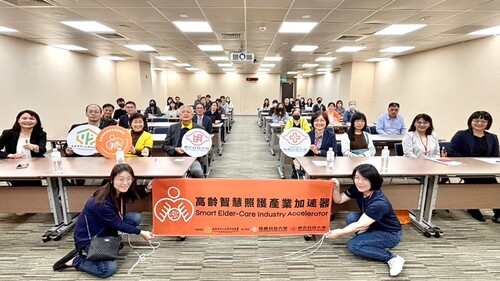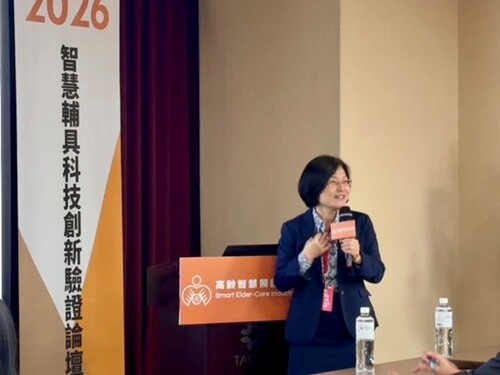Smart Elder-Care Industry Accelerator (SECIA) The 2026 Smart Assistive Technology Innovation Verification Forum Successfully Concluded: Government, Industry, Academia, and Research Unite to Explore the Future of Elderly Care.


To accelerate the integration of smart assistive technologies into long-term care settings and to strengthen the application of innovative technologies in elderly care, the “2026 Smart Assistive Technology Innovation and Verification Forum” was held in grand fashion on the afternoon of April 10, 2025, at the Taipei Nangang Exhibition Center.
The forum was organized by the Smart Elder-Care Industry Accelerator (SECIA), a joint initiative between Ming Chi University of Technology and Chang Gung University of Science and Technology. It was guided by the Small and Medium Enterprise Administration under the Ministry of Economic Affairs, and co-organized by the Taiwan Assistive and Long-Term Care Industry Development Association, the ICF Assistive Technology Research Center at National Yang Ming Chiao Tung University, ATHOME, among others, with the goal of jointly advancing Taiwan’s smart assistive technology innovation ecosystem.
Centered on the theme “Dual-Helix Acceleration × Forward-Looking Validation × Co-Creating a Smart Future,” the forum focused on strategies for implementing and verifying smart assistive technologies in the long-term care sector. The event drew enthusiastic participation from across the industry, including smart assistive device startups, medical device manufacturers, rental service providers, and long-term care institutions, fostering vibrant exchanges and yielding fruitful outcomes.
Director-General Chien-Fang, Chu of the Department of Long-Term Care under the Ministry of Health and Welfare attended the forum in person and delivered a keynote speech. She highlighted that Taiwan is on the cusp of becoming a super-aged society, with rapidly increasing demand for long-term care services. The adoption of smart assistive technologies, she noted, not only reduces the burden on caregivers but also enhances the quality of life and autonomy of individuals with disabilities. To support this, the government will continue to promote measures such as rental subsidies for assistive devices, real-world testing programs, and regulatory flexibility to guide startups and companies in developing practical, field-oriented solutions. These innovations are being actively integrated into home-based, community-based, and residential care services.
Mini Liu, Chief Operating Officer of the smart assistive technology brand ATHOME, was also invited to speak at the forum. She shared practical insights on how startup teams can navigate policy trends and subsidy mechanisms while advancing their research and field validation. Liu emphasized that under the current long-term care payment scheme (Package 3), a dedicated subsidy system for smart assistive devices is in place, offering up to NT$60,000 every three years. This applies to five major product categories: transfer aids, mobility aids, toileting aids, care beds, and safety monitoring devices. She further noted that transitioning from development to market readiness requires not only product functionality and user testing, but also alignment with reimbursement criteria and rental procedures. “Technology can only change lives if it truly enters the care environment,” she remarked.
Dr. Kuo-Yung Hung, Dean of the College of Engineering and Director of the Research Center for Intelligent Medical Devices at Ming Chi University of Technology, presented collaborative achievements between academia and industry. These include the portable thermal therapy vest, and an autonomous mobile care robot, all of which have demonstrated successful results through field validation. Dr. Hung explained that SECIA’s accelerator model connects medical institutions, long-term care facilities, and manufacturers to support startups in conducting real-world testing and gathering clinical feedback—key steps toward commercialization and market alignment. “Innovation in assistive technology is not just about technology; it’s about integration and trust. We aim to help more startups enter the long-term care industry the right way,” he said.
The forum also featured the release of SECIA’s strategic research report, “Strategies for Integrating Smart Assistive Technologies into Long-Term Care Settings”, which proposed three key recommendations: accelerating the development of verification platforms, fostering collaborative innovation across sectors, and building inter-ministerial support systems. Widely endorsed by government, academic, and industry representatives, the report marks another step forward in shaping Taiwan’s smart long-term care future. As a key event in the 2025 Taiwan Assistive Technology and Long-Term Care Expo, the forum successfully bridged policy and industry, symbolizing a new milestone in the advancement of smart aging solutions in Taiwan.
中文:高齡智慧照護產業加速器(SECIA)2026智慧輔具科技創新驗證論壇 圓滿落幕 政產學研齊聚共探高齡照護新未來
This article is simultaneously published in the 29th edition of the SDGs E-paper.






